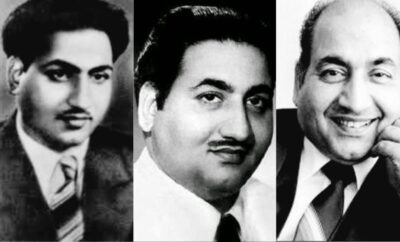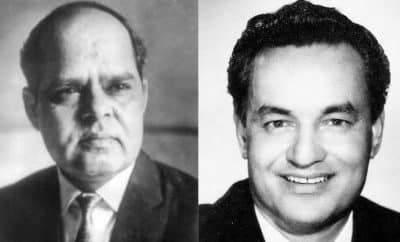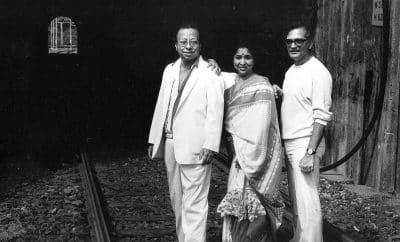Legends
Mukesh with Various Composers – Part 1
All the golden era playback singers were indeed God’s gift to mankind (not to discount the contribution by the composers, the lyricists, and the musicians, of course!). Some of them were all-rounder and versatile, while some had a limited range with unique strengths. While the former set of singers ruled the landscape of film music, the singers in the latter set too carved out a niche for themselves and created their own special places in the hearts of the music lovers.
One of the predominant names in the latter cadre is Mukesh. He remained the inimitable and unparalleled voice of melancholy for over three decades. Due to the inherent deep timbre and the nasal twang, he could paint several shades of pathos effectively. This very texture of his voice made it suitable also for romantic numbers. While a few composers perceived these unique traits of Mukesh’s voice as limitations, a few others capitalised on these very “limitations” and created numerous memorable masterpieces in alliance with him. His strength was that he was well aware of his limitations, and he kept on pleasing music lovers for several decades remaining well within his limitations.
As he was the ghost voice of Raj Kapoor, his preferred composers Shankar – Jaikishan used Mukesh’s voice extensively across several genres. Obviously therefore, a considerable portion of Mukesh’s repertoire comprises SJ songs. While many other composers remained selective about him, a few composers like Anil Biswas, Salil Chowdhury, Roshan, Kalyanji – Anandji and Laxmikant Pyarelal used Mukesh conspicuously in their music. And most of them too have used Mukesh across the songs expressing a variety of emotions other than melancholy.
Let us relish one by one some of the gems that a few mainstream composers (other than SJ) have created in collaboration with Mukesh.
1. Anil Biswas – Dil Jalta Hai To Jalne De (Pehli Nazar – 1945)
Anil Biswas, the Bheeshma Pitamaha of Hindi film music certainly deserves the first mention here. While Mukesh was singing and acting since 1941, he got noticed as a playback singer with Anil Biswas’ “Dil jalta hai to jalne de” in 1945 (the song was written by Aah Sitapuri). Like many other rising singers in that era, Mukesh too was thoroughly impressed with K.L. Saigal and had started the career by imitating him. He so closely imitated K.L. Saigal in “Dil jalta hai to jalne de” that Saigal has gone on record to remark after hearing the song – “I don’t recollect having recorded this song”!
The song was scheduled to be recorded in HMV. However, Mukesh did not show up for a long time. Anil Biswas and his troop eventually could trace Mukesh around 11 in the night, who was fast asleep having forgotten the recording. Anil Biswas lost his temper and slapped Mukesh. Mukesh went to the bathroom, wept a lot, and said to Anil Biswas thereafter, “Let’s record the song now.” And then the historic song came into being.
Mukesh thereafter sang quite a few songs under Anil Biswas’ baton until Anil Biswas’ career started fading after the 1940s.
2. Naushad – Tu Kahe Agar (Andaaz – 1949)
Mukesh gave several hit songs under the baton of Naushad in Anokhi Ada (1948), Mela (1948) and Andaz (1949). Alongside other songs from Andaz, “Tu kahe agar”, written by Majrooh Sultanpuri became a big sensation and continues to be popular even today. Despite so many consecutive hits, Naushad shifted his focus away from Mukesh for next two decades thereafter. Mukesh has rendered only 25 plus songs for Naushad.
Many changes in Naushad’s music were noticed when the 1940s were coming to an end –he did not team up with Majrooh Sultanpuri for two decades thereafter, Mohammed Rafi and Indian classical music took the front seats and Mukesh became a rare appearance.
3. C. Ramchandra – Jap Jap Jap Jap Jap Re (Sharada – 1957)
Ramchandra also rarely used Mukesh in his songs. All in all, Mukesh has sung only 4 odd songs for C. Ramchandra. One of their well-known joint songs is “Jap jap jap jap jap re”, filmed on Raj Kapoor and written by Rajinder Krishan for Sharada (1957). In this song, Raj Kapoor is seen wooing Meena Kumari in a comic way. The song is unique not only because of the rare C. Ramchandra – Mukesh alliance, but also because it is comedy song, which is a rarity so far as Mukesh is concerned.
4. S. D. Burman – O Jaanewaale, Ho Sake To Laut Ke Aana (Bandini – 1963)
While Mohammed Rafi and Kishore Kumar were S.D. Burman’s mainstays among the male singers, he used other singers like Talat Mahmood and Mukesh only exceptionally, when he was sure that no one else could do justice to those particular compositions. After all, he was known to be quite adamant about his insistence on a particular singer, instrument, or musician for a particular song and his adamance would only enrich the composition surely.
Mukesh’s association with S.D. Burman started in S.D. Burman’s early years in Hindi cinema with Vidya (1948) and lasted till Barood (1976), which was almost the end of his career. But in this span 28 years, Mukesh sang only 12 odd songs under S.D. Burman’s music direction. Another interesting fact is that in the initial years of S.D. Burman’s career, when both Kishore Kumar and Mohammed Rafi had sung only a song or two for him, Mukesh had six S.D. Burman songs to his account. This works out to 50% of their total joint repertoire and is most probably the highest number of songs that a male singer rendered for S.D. Burman in the 1940s.
Another surprising fact – when we think of the songs that S.D. Burman composed for Dev Anand, we can’t think of any singer other than Rafi or Kishore. But the first solo that S.D. Burman composed for Dev Anand is sung by Mukesh! The songs is – “Bahe na kabhi nain se neer” from Vidya (1948).
One of their most notable joint songs is “O jaanewale, ho sake to laut ke aana” from Bandini (1963), a poignant word picture with a rustic touch adeptly painted by Shailendra. When Kalyani (Nutan), broken by her unsuccessful love and father’s misery, is about to leave her village clandestinely, the song plays in the background, as though the village, it’s roads and lanes, the river, the trees, everything is trying to pull her back. Pathos in Mukesh’s voice perfectly compliment the pain in Kalyani’s eyes. This song too has a beautiful use of chorus, representing the collective voice of the village surroundings.
5. Madan Mohan – Bhooli Hui Yaadon (Sanjog – 1961)
Mukesh had sung a solo (“Preet laga ke maine ye phal paaya”) and a duet with Shamshad Begum in Madan Mohan’s very first film, Aankhen (1950). But later, Mukesh was almost completely off Madan Mohan’s radar, except a few sporadic songs with big gaps. In aggregate, he gave Mukesh only 9 songs, both solos and duets included.
One of their best songs in alliance is the heart wrenching number “Bhuli hui yaadon, mujhe itna na sataao” from Sanjog (1961). The lyrics are written by Rajinder Krishan.
6. Roshan – Tum Agar Mujhko Na Chaho (Dil Hi To Hai – 1963)
Just like Madan Mohan, Mukesh’s association with Roshan started with one of Roashan’s initial movies (the second movie to be precise), Bawre Nain (1950). But unlike Madan Mohan, Roshan remained steady with Mukesh and gave him quite a few memorable songs even later, though his preferred singers changed.
One of his noteworthy songs with Mukesh is “Tum agar mujhko na chaaho to koi baat nahin” from Dil Hi To Hai (1963), wherein Raj Kapoor deals with his heartbreak with a practical approach (only Sahir Ludhianvi can prescribe such a way to deal with heartbreak!). The song makes us sympathise for Raj Kapoor, yet simultaneously amuses us.
7. Hemant Kumar – Maine Kaha Tumse Humein Pyaar Hai (Maa Beta – 1962)
Hemant Kumar used Mukesh for only a few songs. Most of the songs are duets and a couple of them group songs from the underrated but fantastic comedy film Biwi Aur Makan (1966). Surprisingly, Mukesh seems to have rendered no solo under Hemant Kumar’s baton.
Here is a lovely romantic Mukesh – Lata duet composed by Hemant Kumar and written by Prem Dhawan for Maa Beta (1962).
Interestingly, Mukesh versions of two songs known to be sung by Hemant Kumar – “Gori chori chori jaana buri baat hai” (solo) and “Ye hansta hua kaarwaan zindagi ka” (a duet with Asha Bhosle), both from Ek Jhalak (1957) – are available on YouTube. However, these versions do not find place in the film.
8. Salil Chowdhury – Maine Tere Liye Hi Saat Rang Ke Sapne Chune (Anand – 1971)
Salil Chowdhury is one of the very few composers who made extensive use of Mukesh’s voice for a variety of songs. Salil Chowdhury utilised the unique quality of Mukesh’s voice so adeptly in all his compositions that listening to them one feels like – none but Mukesh could have rendered these songs. Mukesh always sounded very mellifluous in Salil Chowdhury’s songs and theirs was an extraordinary combination which brought in exclusive songs in Hindi film music. The combination had a serene and placid dream-like beauty in it.
Jaagte Raho (1956), Madhumati (1958), Chhaya (1961), Prem Patra (1962), Anand (1971), Annadata (1972), Rajnigandha (1974) and Chhoti Si Baat (1975) are some of the movies which have some memorable Salil Chowdhury – Mukesh songs.
One of the biggest hits of both of them together is Gulzar’s “Maine tere liye hi saat rang ke sapne chune” from the eternal classic Anand (1971).
The tune was originally composed by Salil Chowdhury for the Bangla song “Shudhu tommari jonne shur taal aar gaan bendhechhi”, then sung by his wife Sabita Chowdhury. The Bangla song has since been sung by various artistes including Suresh Wadkar for Jibon (1986).
9. Kalyanji Anandji – Chaand Aahein Bharega (Phool Bane Angaare – 1963)
While Kalyanji Anandji worked with all the prominent singers of the golden era of Hindi film music and they introduced and fostered many new singers, their music was marked by wonderful use of the voices of Mukesh and Kishore Kumar. The latter became a predominant singing entity in their music in the 1970s with the beginning of the Amitabh era and Rajesh Khanna’s superstardom. However, their association with Mukesh started with Bedard Zamana Kya Jaane (1959) – Kalyanji’s solo film and Madari (1959) – one of the duo’s initial films; and continued to till Mukesh breathed his last in 1976; though Mukesh predominantly featured in their music in the 1960s.
Kalyani Anandji used Mukesh’s sonorous voice also for various actors – Manoj Kumar, Shammi Kapoor, Raj Kumar, Joy Mukherjee, Dharmendra, Shashi Kapoor, Rajesh Khanna, Sunil Dutt and Feroz Khan, to name a few.
“Chaand aahein bharega” from Phool Bane Angaare (1963), which is an ode to bountiful beauty, is one of their best joint songs.
10. R. D. Burman – Jis Gali Mein Tera Ghar Na Ho Baalma (Kati Patang – 1971)
R.D. Burman also used Mukesh only occasionally (like father, like son!). Mukesh has a repertoire of some 15 songs with R.D. Burman. One of their best combined works is “Jis gali mein tera ghar nah ho baalma” (written by Anand Bakshi) for Kati Patang (1971).
https://www.youtube.com/watch?v=T8Fk442noOA
11. Laxmikant Pyarelal – Taaron Mein Saj Ke (Jal Bin Macchli Nritya Bin Bijli – 1971)
Mukesh has sung highest number of songs (80) for Laxmikant Pyarelal, after Shankar Jaikishan and Kalyanji Anandji. Their association started with Laxmikant Pyarelal’s first movie Parasmani (1963) and lasted for long. Movies with their notable joint songs are Milan (1967), Anita (1967), Patthar Ke Sanam (1968), Shor (1972) and Roti, Kapda Aur Makan (1974).
“Taaron mein saj ke” from Jal Bin Machhli Nritya Bin Bijli (1971) (penned by Majrooh Sultanpuri) is an outstanding composition by Laxmikant Pyarelal and one of the best solos that Mukesh has sung for them.
12. O.P. Nayyar – Chal Akela (Sambandh – 1969)
O.P. Nayyar had his preferred set of singers – viz. Asha Bhosle, Mohammed Rafi, Shamshad Begum, Geeta Dutt and Mahendra Kapoor. Obviously, Mukesh got to sing only so much as 4 songs for him. Their well-known song “Chal akela, chal akela, chal akela” from Sambandh (1969) is popular to date. The song also has a rare combination of Kavi Pradeep and O.P. Nayyar.
The sheer glimpse of the variety of Mukesh’s songs sung for various composers is enough to shatter the (mis)belief that he was good only for melancholic songs. Wait, there is much more to this – some more songs for some more composers! Part 2 of the writeup is arriving soon.




Does prime biome work
April 4, 2025 at 8:16 pm
Your blog has quickly become one of my favorites I am constantly impressed by the quality and depth of your content